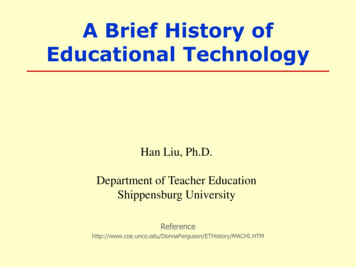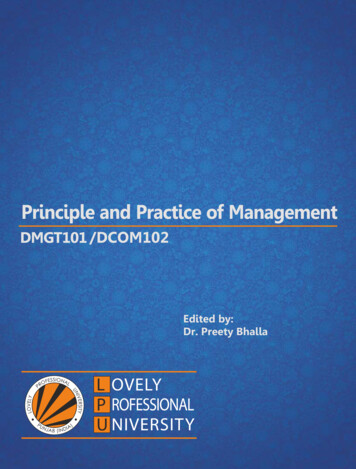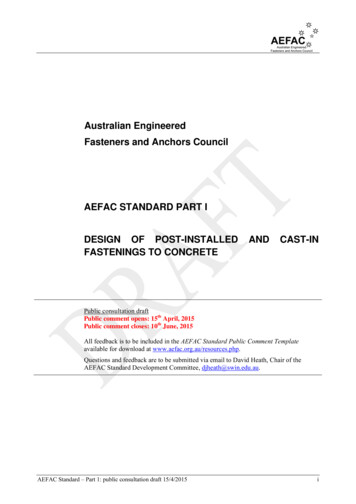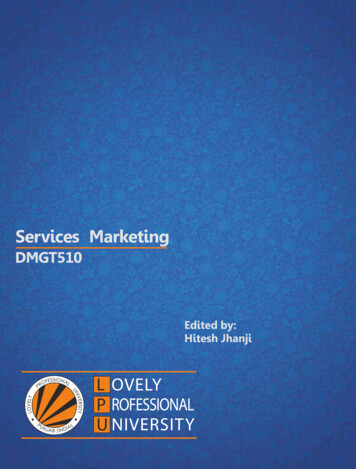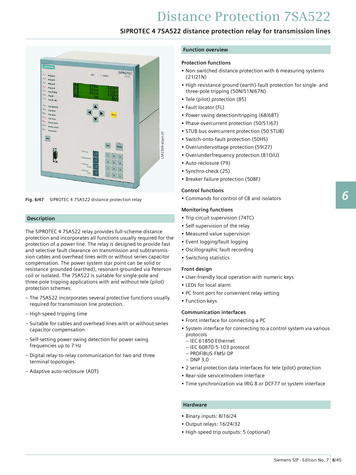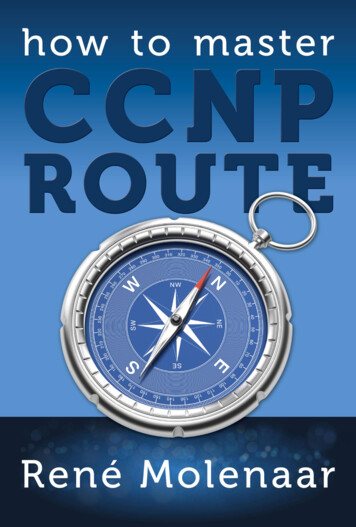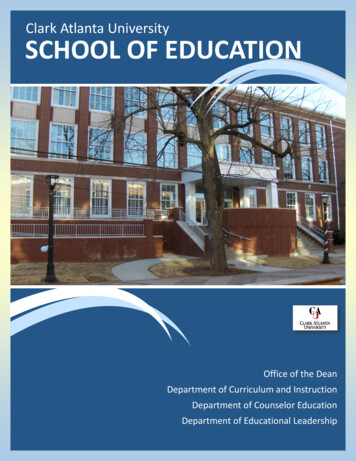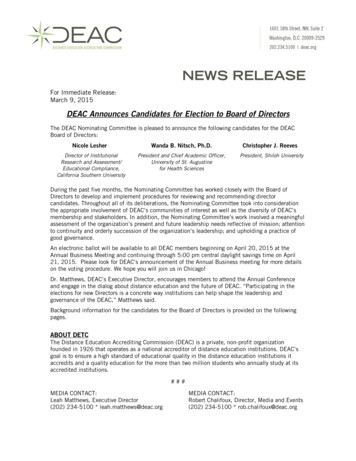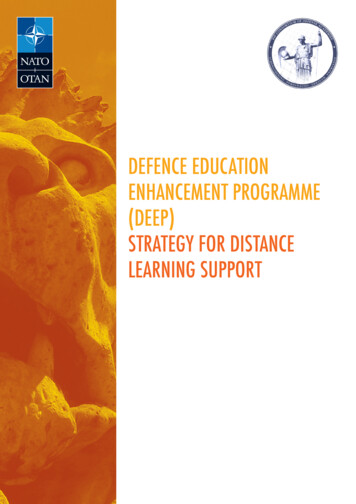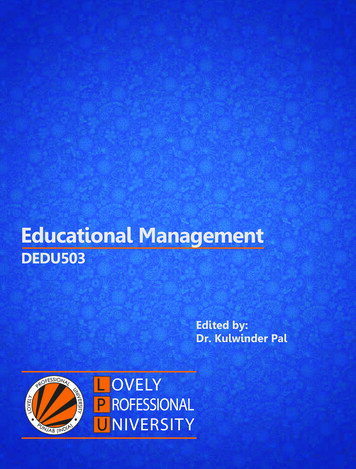
Transcription
Educational ManagementDEDU503Edited by:Dr. Kulwinder Pal
EDUCATIONAL MANAGEMENTEdited ByDr. Kulwinder Pal
Printed byUSI PUBLICATIONS2/31, Nehru Enclave, Kalkaji Ext.,New Delhi-110019forLovely Professional UniversityPhagwara
SYLLABUSEducational ManagementObjectives:To enable the learners to(1) become effective manager of teaching /administration of education.(2) be acquainted with the central and state machinery for educational administration and management.(3) To enable the students to get some insight into supervision, inspection and know trends of developmentSr. No.DescriptionEducational management: concept, nature and scope, difference between1administration and management, Characteristics of good management, Process ofEducational management, Management at different levels-elementary, secondary,higher education.SWOT analysis: concept and process, Application of SWOT analysis at various2levels of education.Managerial process and its importance, Planning: process and means, Organizing:3process and means, Controlling and staffing: process, means and new practices,group dynamics and motivation.4Implementing and decision making: process and means, Leadership style andtheories of leadership, Job accountability, management training: needs and means.5Concept of PERT and CPM, Cost-benefit and cost-efficiency analysis in education,Participation of stakeholders in educational management, Promoting need basededucational programmes.6Educational supervision: meaning, nature and types, Qualities of an effectivesupervisor, Planning and organizing supervisory activity.7School inspection, Application of educational management in academic areas,Application of educational management in administrative areas.Quality management in education: Challenges, Total quality management, Time8management, Quality improvement issues in higher education.IQAC in higher education institutions, Professional Learning Community (PLC) in9Education, IIEP as an Apex body in Educational planning and management.NUEPA as an Apex body in Educational planning and management, SIEMAT as an10Apex body in Educational planning and Management, UGC-NAAC as an Apex bodyin Educational planning and management.
CONTENTSUnit 1:Educational Management : Concept, Nature and Scope, Difference between Administrationand Management, Characteristics of Good Management1Dinesh Kumar, Lovely Professional UniversityUnit 2:Process of Educational ManagementKulwinder Pal, Lovely Professional University11Unit 3:Management at Different Levels-Elementary, Secondary, Higher EducationDinesh Kumar, Lovely Professional University23Unit 4:SWOT Analysis: Concept and ProcessKulwinder Pal, Lovely Professional University69Unit 5:Application of SWOT Analysis at Various Levels of EducationDinesh Kumar, Lovely Professional University76Unit 6:Managerial Process and its ImportanceKulwinder Pal, Lovely Professional University83Unit 7:Planning : Process and MeansDinesh Kumar, Lovely Professional University91Unit 8:Organizing : Process and MeansKulwinder Pal, Lovely Professional University104Unit 9:Controlling and Staffing: Process, Means and New Practices, Group Dynamics and MotivationDinesh Kumar, Lovely Professional University110Unit 10:Implementing and Decision Making: Process and MeansKulwinder Pal, Lovely Professional University123Unit 11:Leadership Style and Theories of LeadershipDinesh Kumar, Lovely Professional University131Unit 12:Job Accountability, Management Training: Needs and MeansKulwinder Pal, Lovely Professional University150Unit 13:Concept of PERT and CPMDinesh Kumar, Lovely Professional University158Unit 14:Cost–Benefit and Cost–Efficiency Analysis in EducationKulwinder Pal, Lovely Professional University167Unit 15:Participation of Stakeholders in Educational Management179Unit 16:Promoting Need based Educational ProgrammesKulwinder Pal, Lovely Professional University196Unit 17:Educational Supervision: Meaning, Nature and TypesDinesh Kumar, Lovely Professional University215Unit 18:Qualities of an Effective SupervisorKulwinder Pal, Lovely Professional University228Dinesh Kumar, Lovely Professional University
Unit 19:Planning and Organizing Supervisory ActivityKulwinder Pal, Lovely Professional University239Unit 20:School InspectionDinesh Kumar, Lovely Professional University258Unit 21:Application of Educational Management in Academic AreasKulwinder Pal, Lovely Professional University267Unit 22:Application of Educational Management in Administrative AreasDinesh Kumar, Lovely Professional University284Unit 23:Quality Management in Education: ChallengesKulwinder Pal, Lovely Professional University309Unit 24:Total Quality ManagementDinesh Kumar, Lovely Professional University320Unit 25:Time ManagementKulwinder Pal, Lovely Professional University329Unit 26:Quality Improvement Issues in Higher EducationDinesh Kumar, Lovely Professional University343Unit 27:IQAC in Higher Education InstitutionsKulwinder Pal, Lovely Professional University353Unit 28:Professional Learning Community (PLC) in EducationDinesh Kumar, Lovely Professional University359Unit 29:IIEP as an Apex Body in Educational Planning and ManagementKulwinder Pal, Lovely Professional University366Unit 30:NUEPA as an Apex Body in Educational Planning and ManagementDinesh Kumar, Lovely Professional University377Unit 31:SIEMAT as an Apex Body in Educational Planning and ManagementKulwinder Pal, Lovely Professional University383Unit 32:UGC-NAAC as an Apex Body in Educational Planning and ManagementDinesh Kumar, Lovely Professional University392
Dinesh Kumar, Lovely Professional UniversityUnit 1: Educational Management: Concept, Nature and Scope .Unit 1: Educational Management: Concept, Nature andScope, Difference between Administration andManagement, Characteristics of Good ManagementNotesCONTENTSObjectivesIntroduction1.1 Concept of Educational Management1.2 Need of Educational Management1.3 Nature of Educational Management1.4 Scope of Educational Management1.5 Principles of Educational Management1.6 Difference between Administration and Management1.7 Characteristics of Good Management1.8 Summary1.9 Keywords1.10 Review Questions1.11 Further ReadingsObjectivesThe objectives of this unit can be summarised as below : To explain about the Concept of educational management To discuss about the need of educational management To describe about the nature of educational management To discuss about the scope of educational management To discuss about the difference between management and administration To describe about the characteristics of good management.IntroductionEducational management is a field of study and practice concerned with the operation of educationalorganizations. Educational management is centrally concerned with the purpose or aims of education.These purposes or goals provide the crucial sense of direction to underpin the management ofeducational institutions. Unless this link between purpose and management is clear and close, thereis a danger of "managerialism . . . a stress on procedures at the expense of educational purpose andvalues". "Management possesses no super-ordinate goals or values of its own. The pursuit of efficiencymay be the mission statement of management - but this is efficiency in the achievement of objectiveswhich others define".LOVELY PROFESSIONAL UNIVERSITY1
Educational ManagementNotes1.1 Concept of Educational ManagementThe origin of the development of educational management as a field of study began in the UnitedStates in the early part of the 20th century.Development in the United Kingdom came as late as the 1960’s Herding wrote a Practical handbook ofSchool Management by Teachers. (1) Some General Principle of Management Applied to the Problems ofSchool System Franklin Bobbit of the University of Chicago published an article in 1913. (2) JesseNewton published Educational Administration as a Social Policy (1934). (3) Koopman et.al, wroteDemocracy in School Administration (1934).Meaning of Educational ManagementEducational management operates in educational organizations. As Tony Bush (1986), puts its, “Mostof the definitions of educational management which have been offered by writers are partial becausethey reflect the particular sense of author. Those which attempt a broader approach are often bland.”“School management, as a body of educational doctrine, comprises a number of principles andprecepts relating primarily to the technique of classroom procedure and derived largely from thepractice of successful teachers. The writers in the field have interpreted these principles and preceptsin various ways, usually be reference to larger and more fundamental principles of psychology,sociology and ethics.” -Paul Monroe : (1913)“Management implies an orderly way of thinking. It describes in operational terms what is to bedone, how it is to be done, and how we know when we have done. Management is not an arcanemystique. It is a method of operation. Good management should result in an orderly integration ofeducation and society-Shelley Umana : (1972)1.2 Need of Educational ManagementWhile writing about the purpose of educational management Kandel says, “Fundamentally thepurpose of educational management is to bring pupils and teachers under such conditions as wellas more successfully promote the ends of education. “Sir Graham Balfour writes very aptly, “thepurpose of educational management is to enable the right pupils to receive to the right educationfrom the right teachers, at a cost within the means of the state, which will enable pupils to profit bytheir learning.In a democratic country like ours, educational management is a necessity. Some suitable, stableelements are properly motivated and organised in the machinery becomes necessary to withstandand survive the changes and upheavals caused because of change of Governments. Superioreducational management in fact is so basic to the satisfactory functioning of democracy. Errors ofjudgement can be retrieved in a farm or factory but these can be fatal when we are concerned withthe moulding or ideas and values of society. An efficient and sound system of educationalmanagement is, in fact the basis of a good democracy.1.3 Nature of Educational ManagementIt is the management of educational institutions to foster teaching and learning. As a field of practice,it has some aspects in common with other fields of management, such as public administration,hospital administration and business management. As a field of study emerged first at the Teacher’sTraining College of Columbia University and was followed shortly by graduate programme ofStanford University, University of Chicago and other institutions in the U.S.A. Indian Universitiesit had its place only in the 1670s. Since the 1950s educational tration has become a field of study inits own right. As an applied field it has much in common with other applied fields such as medicine,engineering, etc. It builds upon psychology, sociology, economics, political science and otherbehavioural sciences. For the part twenty to thirty years emphasis has increased on the development2LOVELY PROFESSIONAL UNIVERSITY
Unit 1: Educational Management: Concept, Nature and Scope .of theory and research in educational management. Also has increased understanding of educationalorganization and the people working in them yet, there is much to be achieved.NotesWith the beginning of 1970s a new era has emerged in the field of educational management. Changeshave been taking place in all its aspects, conceptual as well as operational. At the conceptual levelnew terms, constructs and approaches are being introduced and used. Even the very nomenclatureof the field seems to be changing. The terms educational management and educational organizationare frequently being used in place of educational management.(1) Dynamic FunctionAs a dynamic function, educational management has to be performed continuously, in an everchanging environment. It is constantly engaged in the moulding of the enterprise. It is alsoconcerned about the alternation of environment itself so as to ensure the success of the enterprise.Thus, it is a never-ending function.(2) PracticabilityThe school management must not be a bundle of theoretical principles, but must provide practicalmeasures to achieve the desired objectives Whatever the objective that is decided must be madeachievable and practicable to avoid frustration.(3) Distinct ProcessManagement is a distinct process to be performed to determine and accomplish stated objectivesby the use of human beings and other resources. Different form of activities, techniques andprocedures, the process of management consists of such functions as planning, organizingstaffing, directing, coordinating, motivating and controlling.(4) Needed at All Levels of the OrganizationAccording to the nature of task and the scope of authority, management is needed at all levelsof the organization, e.g. top level, middle level and supervisory level. Like the executive thelowest level supervisor has also to perform the function of decision-making in way or another.(5) System of AuthorityAuthority to get the work accomplished from others is implied in the very concept ofmanagement since it is a process of directing men to perform a task. Authority is the power tocompel men to work in a certain manner. Management cannot work in the absence of authoritysince it is a rule-making and rule-enforcing body. There is a chain of authority and responsibilityamong people working at different levels of the organization. There cannot be an efficientmanagement without well-defined lines of command or superior - subordinate relationships atvarious levels of decision making.Management as an artAs an art, management is about carrying out organisational functions and tasks through people.This art involves the application of techniques in : human and public relations the delegation of an authority : assigning and sharing responsibilities and duties communication : including decision-making and problem-solving. managing change.Management as a scienceManagement here is concerned with establishing a philosophy, laws, theories, principles, processesand practices which can be applied in various situations, including schools.LOVELY PROFESSIONAL UNIVERSITY3
Educational ManagementNotesManagement as an organisationAs an organisation, management is about creating formal structures and an establishment based ona mission (or goals), objectives, targets, functions and tasks. For example, social and welfareorganisations in government management can refer to education and health services, whilst publicsecurity management services could refer to the police and military.Management as a personManagements may be seen as a person or a group of people. For example, a teacher could say ‘Theschool management has changed the timetable in the middle of the term’. This could be referring toyou, as the head alone, or to all the senior staff, or it could refer to the members of the board ofgovernors or school committee. In schools with several promoted staff a ‘senior management team’might be formed in much the same way as a government has a cabinet of ministers.Management as a disciplineIn this sense, management is a field of study with various subjects and topics. Knowledge, skills andattitudes in management can be acquired through learning, from experience and from certificatedcourses.The functions of managersWe will briefly examine five main functions of managers, namely : planning, organising, directing,supervising and evaluating.Management is a collection of processes, including such things as decision-making,problem-solving and action-planning. These processes involve the management ofresources including human, material, financial and time. These processes are alsoknown as the functions of managers.1.4 Scope of Educational ManagementBy scope, we mean the area within which functioning of educational management takes place. Thescope of educational management today is as vast as that of education itself. Any activity conduciveto the, achievement of educational goal, is a part of educational management. Such activities couldbe at the school level, at the college level, at the university level or at the control level. Anythingdone to improve the quality of education at any stage may be ranging from the supply of material,human and financial resources to the highest cultural or academic needs-comes under the scope ofeducational management. Hence we shall consider the scope of educational management under thefollowing heads.(1) Goal Development : The educational system is a sub-system of a society, and therefore thesociety not only provides human and non-human resources but also certain expectations thatthe system of education will achieve certain goal. Since society is in a constant process of change,needs of the society change an so do the goal specifications. It is necessary for the educativeprocess to be responsive to these changing expectations and it is through the educationalmanagement system that persons involved in the process of management can continuouslyexamine, evaluate and change (if appropriate) the goals of education.(2) Programme Planning and Actualization : According to the Oxford English Dictionary, Planningis “to design some actions to be done before hand”. Philips regards it is “the process of settingin advance a pattern of action to bring about overall national policies by the closest possiblemeans and end.” Thus we can say that planning is the process of preparing a set of decisions4LOVELY PROFESSIONAL UNIVERSITY
Unit 1: Educational Management: Concept, Nature and Scope .for action in the future and directed towards realising some goals by the best possible means.The essence of planning is the appraisal of as many operational alternatives as possible ant thenselecting the best for launching action. “Planning selects among alternatives, explores routesbefore travel begins and identifies possible or probable outcomes of actions before the executiveand the organisation is committed to any.”NotesAccording to the Education Commission (1964-66) planning at the first two stages, i.e., nationallevel and state levels alone suffers from some deficiencies such as (i) lack of emphasis on localissues in educational development, (ii) non-involvement of educational workers, and (iii)overemphasis on expenditure-oriented programmes. Planning at the local level, i.e. collegelevel is only to offset these drawbacks. Planning at the college level does not mean that theprincipal or a few of the members of the faculty prepare the plan for various activities of thecollege. Instead it is a cooperative endeavour of all those who are involved in the implementationof the plans-not only members of the faculty, teaching and non-teaching, but even the students,the parents and the local communities must be associated while planning of the programmes.The goals that are developed by the management system become the rationale for programmeplanning and actualization. Programmes represent the intended engagement opportunities forstudents who are to be educated. The responsibility for the planning and actualization ofprogrammes rests with the management system. It is therefore essential that the managementsystem should provide technological support to the educative process in the form of consultationsand services. The management system should initiate, coordinate, provide services and to be apart of these activities.(3) Organization : Organization has been a problem in the field of education. The debate over thecontrol of education has over and again raised the salient issue of how educational machineryshould be best organised, politically, professionally and administratively. Here too, as in severalother vital areas, education is handicapped by tradition. If conventional biases and prejudicescan be replaced by decisions made logically and scientifically, with the achievement of objectivesas the only consideration modern principles and techniques of organization will provide abasis for effective distribution and co-ordination of functions.1.5 Principles of Educational ManagementA principle is a generally accepted truth, which is based on experience and the available information.Henri Fayol (1916) listed principles of management with regards to human activities, They were : division of work authority, responsibility and accountability discipline unity of command unity of direction centralisation ; decentralisation scalar chain (the chain of command in an organisation) remuneration of personnel subordination of individual interest to general interest equity stability of tenure of personnel initiativesLOVELY PROFESSIONAL UNIVERSITY5
Educational ManagementNotesSelf Assessment1. Fill in the blanks :(i) Educational management, comprises a number of principles and percepts of relating primarilyto the techniques of .(ii) Educational management is a .(iii) According to the nature of the task, educational management is needed at all levels of thee.g. top level, middle level and supervisory level.(iv) Any activity conductive to the achievement of , is a part of .1.6 Difference between Administration and ManagementThe difference between management and administration can be summarised under two categories(1) Functions(2) Usage / anagement is an art of gettingthings done through others bydirecting their effort towardsachievement of pre determinedgoalsIt is Concerned with formulation ofbroad objectives, plans and policies.NatureManagement is an executivefunction.Administration is a decision makingfunction.ProcessManagement decides who should Administration decides what is to beas it & how should he dot it.done and who it is to be doneFunctionManagement decides is doingfunction because managers getwork done under theirsupervision.Administration is a thinking functionbecause plans and policies aredetermined under it.SkillsTechnical and human skills.Conceptual and human skillsLevelMiddle and lower level functionTop level function on the basis yIt is applicable to businessConcerns profit makingorganisation.It is applicable to non businessConcerns, Clubs, Schools, Hospital etc.InfluenceThe management decisions areinfluenced by the values,opinions, beliefs & decisions ofthe managers.The administration is influenced bypublic opinion, govt. policies, religiousorganizations, customs etc.StatusManagement Constitutes theemployees of the organizationwho are paid remuneration in theform of salaries and wagesAdministration represents owners ofthe enterprise who earn return on theircapital invested and profits in the formsof dividendLOVELY PROFESSIONAL UNIVERSITY
Unit 1: Educational Management: Concept, Nature and Scope .1.7 Characteristics of Good ManagementNotesThe characteristics of successful school management are given in the following points :(1) Flexibility,(2) Practicability,(3) Confirmity to the social and political philosophy of the country.(4) Efficiency.(5) Successful achievement of desired objectives.The characteristics of school management details have been given following paragraphs :(1) Flexibility : One of the essential characteristics of successful school management is its flexiblecharacter. The manager should be dynamic, not static; it should provide enough scope foradditions and alternations. The rules and regulations should act as a means to end and not anend in themselves. Dead uniformity and mechanical efficiency is the very antithesis of goodadministration. The framework of administration should provide enough scope to theadministrator to help the needy student, and the needy teacher, to change the time schedule tosuit the weather to meet any emergency. A word of caution here. Flexibility does not meansthat the administration should be in a fluid condition without any specific norm or standardrules and regulations, creating confusion and chaos at every step. What is meant, is a properbalance between rigidity and elasticity.(2) Practicability : The school management must not be a bundle of theoretical principles, but mustprovide practical measure to achieve the desired objectives. Whatever objective is decided itmust be achievable and practicable to avoid frustration.(3) Confirmity to the Social and Political Philosophy of the Country : There must be closeconnection between school management and the social and political philosophy of a country. Itmust adjust itself to the impact of new ideals, new patterns and new moves of the society. In anautocratic country, educational theory and practice will have to be different form that of ademocratic country because education is one of the means to achieve social and politicalobjectives. American education is decentralised and democratised whereas Chinese educationis characterised by regimentation due to political philosophies of the respective countries. InIndia, school administration has to be democratic because of political democracy in the country.(4) Efficiency : Successful management is that which result in maximum efficiency. This will bepossible only when human and material resources are properly utilised- right man at the rightplace; right work at the right time, every activity and project are well planned and well executed.(5) Successful Achievement of Desired Objectives : Successful management is one which leads tothe successful achievement of desired objectives of education in a particular community e.g.,healthy social living, development of good physical, social, moral, intellectual and aestheticqualities and healthy democratic living.School management must facilitate education. It exists for the pupil and its efficiency has to bemeasured by the extent to which it contributes to teaching and learning.Self Assessment2. State whether the following statements are ‘true’ or ‘false’.(i) Management is an executive function.(ii) Administration is an implementing function.(iii) Management is a middle and lower level function.(iv) Administration is a doing function because administrator get work done under theirsupervision.(v) Educational management must provide theoretical measures to achieve the desired objectives.LOVELY PROFESSIONAL UNIVERSITY7
Educational ManagementNotes1.8 Summary Educational management operates in educational organizations. “School management, as a body of educational doctrine, comprises a number of principles andprecepts relating primarily to the technique of classroom procedure and derived largely fromthe practice of successful teachers. “Management implies an orderly way of thinking. It describes in operational terms what is tobe done, how it is to be done, and how we know when we have done. Management is not anarcane mystique. It is a method of operation. Good management should result in an orderlyintegration of education and society In a democratic country like ours, educational management is a necessity. Some suitable, stableelements are properly motivated and organised in the machinery becomes necessary to withstandand survive the changes and upheavals caused because of change of Governments. Superioreducational management in fact is so basic to the satisfactory functioning of democracy. An efficient and sound system of educational management is, in fact the basis of a gooddemocracy. It is the management of educational institutions to foster teaching and learning. As a field ofpractice, it has some aspects in common with other fields of management, such as publicadministration, hospital administration and business management. Dynamic FunctionAs a dynamic function, educational management has to be performed continuously, in an everchanging environment. PracticabilityThe school management must not be a bundle of theoretical principles, but must provide practicalmeasures to achieve the desired objectives Whatever the objective that is decided must be madeachievable and practicable to avoid frustration. Distinct ProcessManagement is a distinct process to be performed to determine and accomplish stated objectivesby the use of human beings and other resources. Needed at All Levels of the OrganizationAccording to the nature of task and the scope of authority, management is needed at all levelsof the organization. System of AuthorityAuthority to get the work accomplished from others is implied in the very concept ofmanagement since it is a process of directing men to perform a task.8 Management as an art As an art, management is about carrying out organisational functions and tasks through people. Management as a science Management here is concerned with establishing a philosophy, laws, theories, principles,processes and practices which can be applied in various situations, including schools. As an organisation, management is about creating formal structures and an establishment basedon a mission (or goals), objectives, targets, functions and tasks. Management as a personLOVELY PROFESSIONAL UNIVERSITY
Unit 1: Educational Management: Concept, Nature and Scope . Managements may be seen as a person or a group of people. For example, a teacher could say‘The school management has changed the timetable in the middle of the term’. This could bereferring to you, as the head alone, or to all the senior staff, or it could refer to the members ofthe board of governors or school committee. Scope of School Management We mean the area within which functioning of educational management takes place. Thescope of educational management today is as vast as that of education itself. Any activityconducive to the, achievement of educational goal, is a part of educational management. Suchactivities could be at the school level, at the college level, at the university level or at the controllevel. Goal Development: The educational system is a sub-system of a society, and therefore t
CONTENTS Unit 1: Educational Management : Concept, Nature and Scope, Difference between Administration and Management, Characteristics of Good Management 1 Unit 2: Process of Educational Management 11 Unit 3: Management at Different Levels-Elementary, Secondary, Higher Education 23 Unit 4: SWOT
